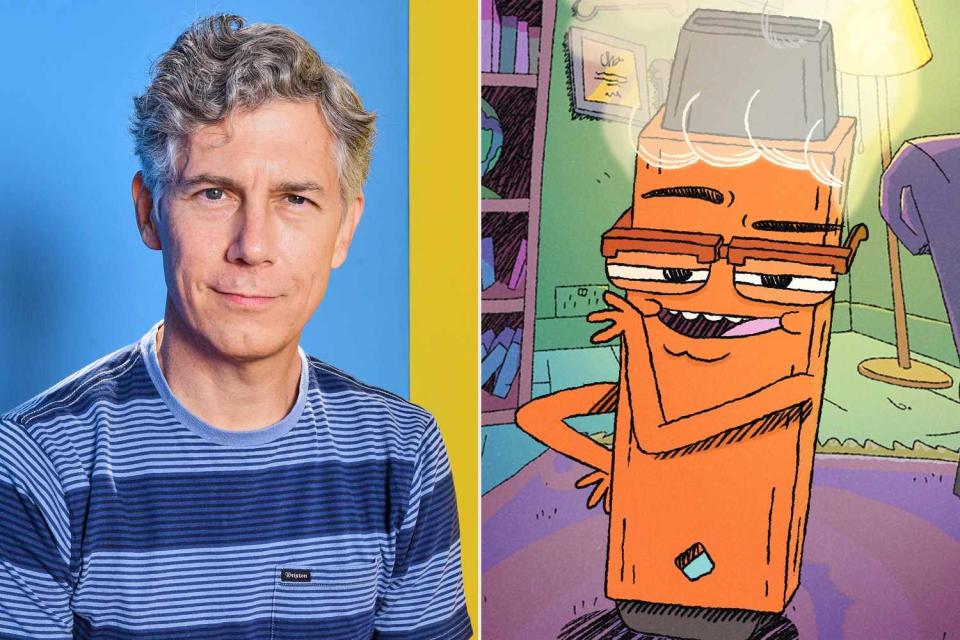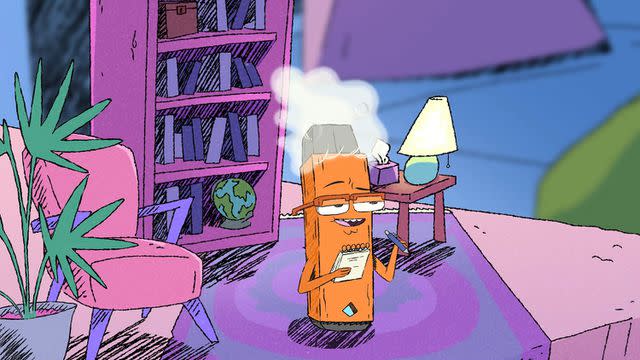“SNL” alum Chris Parnell Voices Evil Vape in New Anti-Vaping Campaign Aimed at Teens (Exclusive)
- Oops!Something went wrong.Please try again later.
The 'Saturday Night Live' alum says he hopes the "crafty and deceptive" vape character will deter teens from the habit that harms their mental health

Irvin Rivera/Getty; Courtesy of Truth
Chris Parnell voices a 'nasty' vape in Truth Initiative campaign.The physical health risks of vaping — using an electronic cigarette to “smoke” nicotine instead of a traditional cigarette — are well-documented, causing lung illnesses and cardiovascular problems.
But most people don't know that vaping can also be detrimental to mental health — particularly among teens — as Truth Initiative shows in its new “Toxic Therapy” campaign, where Chris Parnell voices a “weaselly” vape that acts like a therapist for teens.
“He does not have the best interests of the person in the session in mind,” Parnell tells PEOPLE exclusively about the vape character. “He sounds a lot like a real therapist, but a therapist with an agenda who's not entirely on the up-and-up. [He’s] kind of crafty and deceptive and [there's] nastiness there, too. He's friendly, but a little nasty.”
As Saturday Night Live alum, 56, points out to PEOPLE, teens will vape “as a way to cope with stress and anxiety, and they think it's going to help them, but but all the scientific evidence shows otherwise, shows that it's actually only going to make things worse. It's only going to make the stress and anxiety worse, it's going to make sleep worse.”
It all comes down to nicotine addiction, the CDC says, as nicotine withdrawal can cause those feelings of anxiety.
“Nicotine withdrawal symptoms include irritability, restlessness, feeling anxious or depressed, trouble sleeping, problems concentrating, and craving nicotine,” the agency says. “People may keep using tobacco products to help relieve these symptoms.”
And that’s not all: Nicotine use in adolescence can impair developing brains, specifically “parts of the brain that control attention, learning, mood, and impulse control.”
However, “quitting smoking cigarettes is associated with lower levels of anxiety, depression, and stress, as well as improved positive mood and quality of life,” the CDC says.
That was the case with Karely Alcantara, 21, who teamed up with Truth Initiative as a Truth Ambassador to share her experience with vaping.
“I’ve struggled with anxiety and depression for years, and first started using e-cigarettes in 2016 when I was around 15 years old to cope with these feelings. I honestly loved the buzz nicotine gave me because it made me feel good for a few minutes,” Alcantara tells PEOPLE. "Hitting my vape distracted me from my grief, my sadness, and my anger. It also kept me from getting the help I needed. Eventually, the buzz would go away, and I was feeling worse than when I started."
Parnell said that as a teen, he turned to theater and performing when he was stressed out — and said, “I'm personally a strong believer in talk therapy. I do that for myself.”
Related: Anxiety Screening for All Adults Under 65 Now Recommended at Checkups
He referred to the texting crisis line that Truth offers to help kids reach out to trained crisis counselors by texting HOME to 741741.
Truth also offers a text-based program to help teens stop vaping — This is Quitting — which can be reached by texting DITCHVAPE to 88709. It’s the program that Alcantra says helped her stop vaping for good.

Courtesy of Truth
Chris Parnell voices a therapist vape in Truth Initative's new campaign.“I'm just happy and grateful and honored, frankly, to be a part of [the campaign],” said Rick and Morty star Parnell. “I've got two young sons and I certainly hope they never think about taking up smoking or vaping.”
Related: Aaron Sorkin Says He Had a Stroke Last Year — and It Motivated Him to Quit Smoking
And he says he’s hopeful the campaign will help kids, as “the young person has it in their mind that [vaping] is actually a coping mechanism.”
“But the truth is, it's not it's not going to help them. It's only going to make things worse.”
For more People news, make sure to sign up for our newsletter!
Read the original article on People.

